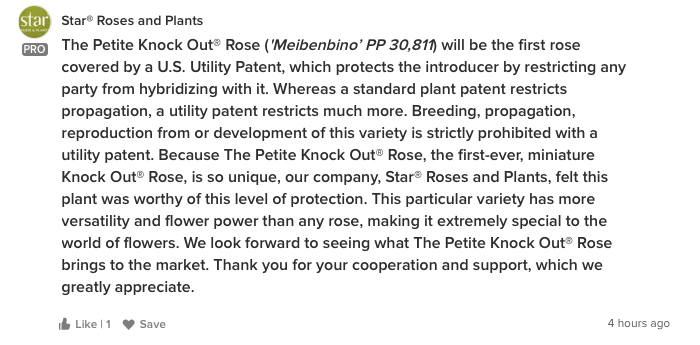I hope Jonathan Windham doesn’t mind me posting here what he wrote on Facebook, which is a good summary of the situation:
Begin quote:
Recently, Star Roses and Plants has decided to introduce the first rose ever to be covered under a utility patent.
This means that no one will be allowed to use it for breeding purposes. If some of its pollen makes its way into my yard and pollinates one of my own hybrids (which I created myself), I could be legally prosecuted for “using” their invention without authorization, should any seeds result from that union.
If this rose produces seed in your yard and that seed germinates in your flower bed, technically you’ve violated their patent.
Utility patents on plants is not new, but this is not the direction the rose industry should take. Doing so will stifle the industry as a whole while the private breeding programs around the country that are producing some seriously unique cultivars die out.
Spring is coming. Please consider not purchasing Star Roses and Plants new Petite Knock Out® Rose ('Meibenbino’ PP 30,811)
There are literally dozens of other miniature, red, healthy landscape roses available that won’t get someone like me (or you) in legal trouble.
-------end quote
As a breeder and the owner of.a retail nursery, my choice is even more stark. I have about 300 roses on order from Star. (which admittedly is a tiny, tiny, drop in their bucket.) Do I get up in arms about this and cancel my entire order? Stop ordering from them in the future and let them know why? That would disallow me from selling a few good roses such as Cancan…and, whoa, Cherry Frost. What about submitting roses for testing? Star had seemed like a great company to work with as a breeder.
It appears they are taking a page from the “Provin Winnurs” playbook. (spelling changed cuz you know damn well they google themselves…I’ve gotten a phone call about Facebook posts that were missing the trademark symbol.) That company makes you agree to a ridiculously broad non-propagation agreement that seems to include sexual reproduction to even order from them. All sports that show up in your stock are “theirs” and you’re required to send them back. They force nurseries like us to put their stuff in ugly white pots that dilutes our own branding. But they’ve got a lock on varieties such as Vsta Bubblegum Pet-unia and Incrdib&ll Hydrangea that are essentially necessities to sell in the trade, so I bite my tongue and jump through their obnoxious hoops.
Am I going to do the same with Star? I feel betrayed, but as someone mentioned it probably is a good business decision for them. What if they licensed me to breed with it if I released the resulting roses through them? Would I suddenly feel better about it?
How can we fight this at a legislative level? Could we (who exactly?) group together and hire a lobbyist to get legislation passed that explicitly forbids this type of genetic overreach?
I’m starting to appreciate how politicians feel when they’re groping blindly in a dark closet trying to find their conscience. I don’t know whether to capitulate or make a stand that would hurt myself more than Star. I don’t know how upset I should be about what could be a practical business decision. I appreciate the thoughts you post here.
